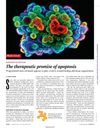 24 citations,
April 2013 in “PLOS ONE”
24 citations,
April 2013 in “PLOS ONE” TNFα, IFNγ, and Substance P significantly affect prolactin levels in human skin, suggesting new treatments for skin and hair conditions.

Nanoformulations improve luteolin's effectiveness as a cancer treatment.
 November 2023 in “Stem cells and cloning”
November 2023 in “Stem cells and cloning” A new treatment using stem cell-conditioned media significantly improved hair growth in people with temporary hair loss.
 96 citations,
September 2021 in “International Journal of Molecular Sciences”
96 citations,
September 2021 in “International Journal of Molecular Sciences” Chitosan, a natural substance, can be used to create tiny particles that effectively deliver various types of drugs, but more work is needed to improve stability and control of drug release.
37 citations,
November 2017 in “Medical Sciences” Melanoma's complexity requires personalized treatments due to key genetic mutations and tumor-initiating cells.
 32 citations,
January 2022 in “International Journal of Molecular Sciences”
32 citations,
January 2022 in “International Journal of Molecular Sciences” Melatonin, a hormone, can help protect skin from aging by reducing stress, inflammation, and damage, and may also help treat hair loss in women.
 6 citations,
December 2022 in “Frontiers in Pharmacology”
6 citations,
December 2022 in “Frontiers in Pharmacology” Quercetin may help improve symptoms of polycystic ovary syndrome.
1 citations,
January 2020 in “International Journal of Trichology” High YKL-40 levels predict early hair loss and hidden metabolic issues.
21 citations,
January 2020 in “Pharmaceutical Biology” Salvia plebeia extract can stimulate hair growth.
 20 citations,
February 2017 in “International Journal of Dermatology”
20 citations,
February 2017 in “International Journal of Dermatology” Honokiol helps protect skin from damage and aging caused by cigarette smoke.
 August 2019 in “Journal of the American Academy of Dermatology”
August 2019 in “Journal of the American Academy of Dermatology” Ginseng and Albizia extracts help prevent hair thinning with age.
 9 citations,
March 2019 in “Science”
9 citations,
March 2019 in “Science” Blocking cell death in certain stem cells can improve wound healing and tissue regeneration.
 January 2024 in “Reproductive toxicology”
January 2024 in “Reproductive toxicology” Hesperidin helps protect against testicular damage caused by finasteride.
August 2024 in “Journal of Photochemistry and Photobiology B Biology” Combining light therapy with certain substances improves hair growth in people with hair loss.
 April 2016 in “Journal of Investigative Dermatology”
April 2016 in “Journal of Investigative Dermatology” A peptide known for reducing wrinkles also effectively inhibits an enzyme linked to skin inflammation and acne.
 10 citations,
January 2016 in “Planta Medica”
10 citations,
January 2016 in “Planta Medica” Formononetin, found in red clover plants, can promote hair regrowth and reduce hair loss by preventing cell death.
 6 citations,
March 2011 in “Experimental Dermatology”
6 citations,
March 2011 in “Experimental Dermatology” Too much or too little selenium in the diet can cause hair loss and graying in mice.
 4 citations,
July 2020 in “BMC Complementary Medicine and Therapies”
4 citations,
July 2020 in “BMC Complementary Medicine and Therapies” Human placenta helps hair grow back after chemotherapy by blocking cell death and increasing hair follicle growth.
 41 citations,
September 2011 in “Journal of Ethnopharmacology”
41 citations,
September 2011 in “Journal of Ethnopharmacology” Panax ginseng extract helps mice grow hair.
 1 citations,
January 2019 in “Advances in Medical Sciences”
1 citations,
January 2019 in “Advances in Medical Sciences” The combination of azelaic acid, minoxidil, and caffeine significantly increased the survival of skin flaps by affecting certain body channels and nitric oxide levels.
 25 citations,
December 2008 in “The Journal of Urology”
25 citations,
December 2008 in “The Journal of Urology” Short-term finasteride treatment may lower some cell death factors in prostate cancer cells.
 April 2019 in “Advances in integrative medicine”
April 2019 in “Advances in integrative medicine” HST and HST/F promote hair growth and may help treat alopecia.
 34 citations,
July 2020 in “Frontiers in immunology”
34 citations,
July 2020 in “Frontiers in immunology” Androgens may influence T cells, contributing to higher autoimmune liver disease risk in women.
 25 citations,
February 2017 in “Anticancer Research/Anticancer research”
25 citations,
February 2017 in “Anticancer Research/Anticancer research” Ozone therapy might improve cancer treatment and reduce its side effects.
 16 citations,
April 2021 in “International Journal of Molecular Sciences”
16 citations,
April 2021 in “International Journal of Molecular Sciences” Micro-current stimulation may promote hair growth more effectively than standard treatments.
 October 2023 in “Scientific reports”
October 2023 in “Scientific reports” Dexamethasone affects hair growth by altering levels of proteins that either promote or inhibit hair follicle growth.
 44 citations,
October 2019 in “International Journal of Molecular Sciences”
44 citations,
October 2019 in “International Journal of Molecular Sciences” Melatonin, usually known for sleep regulation, also has antioxidant properties that can protect skin, stimulate hair growth, and improve skin conditions, with topical application being more effective than oral use.
 January 2024 in “Annals of Dermatology”
January 2024 in “Annals of Dermatology” Korean Red Ginseng may help protect hair from damage and promote growth.
 2 citations,
May 2023 in “Plants”
2 citations,
May 2023 in “Plants” Allium hookeri extract may help promote hair growth and protect cells from damage.
 2 citations,
May 2023 in “Life”
2 citations,
May 2023 in “Life” Plumbagin may help protect cells, reduce inflammation, and has potential for treating various diseases, but more research is needed.

























